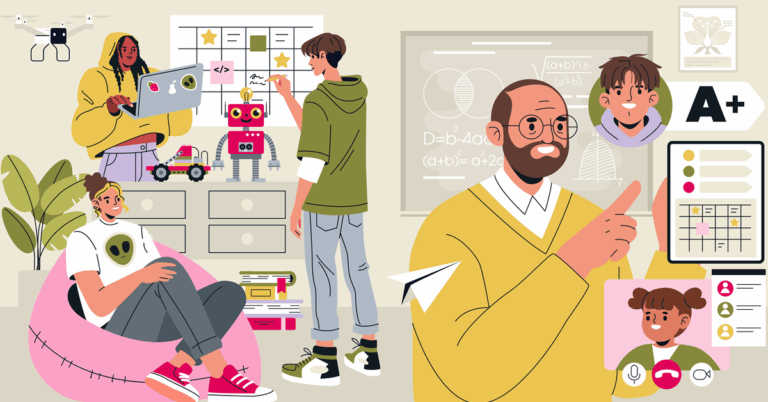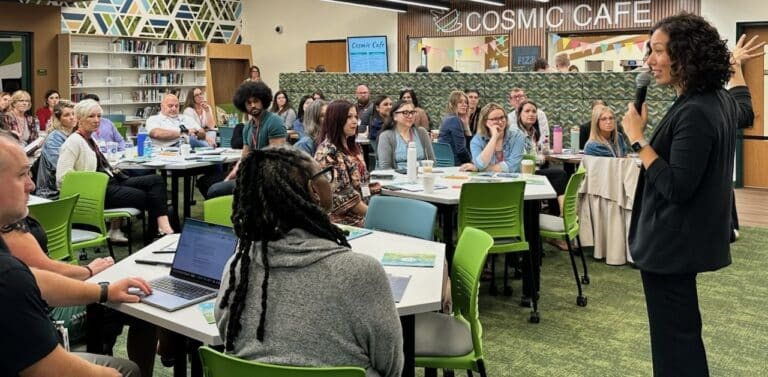Beth Slette’s first year as superintendent of West Fargo Public Schools coincided with the first year the district joined a cohort of North Dakota districts committed to implementing personalized, competency-based learning.
“I don’t know how we would be where we are as a district today without the work of the last six years,” said Slette, who has been working in West Fargo schools for 17 years. Joined by Northern Cass School District, Oakes Public School District and the North Dakota Youth Correctional Center, West Fargo has been implementing learner-centered practices and building their capacity to scale and sustain personalized, competency-based learning.
The cohort recently celebrated six years of work and their transition to the North Dakota Network for Personalized Learning, a network that expands the reach of student-centered learning practices beyond the original four districts. The opportunities the network provides for peer-to-peer learning and leadership development are critical to scale and sustain the work of personalized, competency-based learning in the state.
“When you think about where we’re going today – we have standards-based learning groups, partnerships with higher education, we’ve presented at SXSW EDU and FullScale, we’ve built out a personalized learning framework and a North Dakota learning continuum – this all exists because of what you tried with your students, what you advocated for because of your students,” said Ann Ellefson, academic support director with the North Dakota Department of Public Instruction (NDDPI). “The state department is a better advocate for what kids need because you’ve let us sit at your table. Because of your generosity, we’re able to bring the voice of North Dakota students and advance change at the state level.”
Personalizing learning – and teaching – requires collaboration across districts.
Marisa Riesinger is the elementary library media specialist with Dickinson Public Schools in Dickinson, North Dakota, and became involved with the network this past autumn after attending a personalized learning institute at Northern Cass over the summer. Her previous experiences as a classroom teacher and a literacy coach led her to personalized, competency-based learning.
“Even before personalized learning was a thing, I knew that was how kids learned best,” said Riesinger. “It was nice to see that there’s a cohort of people as passionate about it as I was.”
Riesinger went on a site visit to Northern Cass this past spring and was able to bring educators from one of Dickinson’s elementary schools, Lincoln Elementary. Her peers found the experience as powerful as she did.
“It really opened their eyes to what things could be and also recognizing that things we’re already doing,” Riesinger said. “We might think, wow, we’ll never be where they are, but Northern Cass has been doing this for years. They were like us once, too. It’s a process. We ask our kiddos to focus on growth, and personalized learning is an opportunity for educators to think about their growth. Networking with other educators gives everyone an opportunity to see that.”
Slette explained that while they were interested in personalized, competency-based learning from the start, it wasn’t until they began collaborating with other districts that they realized how much educators in North Dakota had to offer each other.
“There’s this natural resistance to look at another school or district and think, they’re not like us. That what works for another school or district won’t work for us. You get embedded in your own culture,” said Slette. “But this work has to happen in collaboration with other districts. It’s transformational, not transactional.”
Greg Dobitz, principal at Oakes Elementary School, agrees and cites the opportunity the initiative provided to visit other schools – and host schools that wanted to visit them – as pivotal. While West Fargo has more than 12,000 students across 21 schools, Oakes serves approximately 500 students on a single campus. They still had much to teach and learn from each other, with teams of educators from West Fargo visiting Oakes.
“Asking others to come into our school and visiting other schools forced us to reflect and think about how we do things,” said Dobitz. “Once our teachers saw somebody doing it, that’s when progress was made. And anytime we slowed down I said, we need to go see somebody because we’re slowing down.”
According to a report by WestEd, a national leader in research, development and service, on progress and outcomes in North Dakota:
…the peer site visits gave the districts the agency and accountability to take stock of their personalized, competency-based learning practices and determine what to share and where to ask for feedback. Peer visits also served to help educators see what personalized learning could look like. Educators spoke of changing their practices because of feedback received on their instruction during a peer visit. The cohort facilitated district collaboration and shared experiences that would have been highly unlikely without it. Two of the districts aligned their schedules to share professional development days, offering the opportunity to visit one another and/or collaborate virtually on professional learning days despite their geographic distance.
Recalling that she once worried that not everyone from West Fargo got to participate in the convenings, Slette now sees practices spreading by virtue of what her educators and principals are able to learn from each other. The growth of personalized, competency-based learning practices is often organic – and supported by instructional coaches the district employs to help educators take risks and try something new.
“Schools that weren’t at the table during this work, they’re doing it,” said Slette. “It’s growing, and it’s really collaborative.”
What’s next for teaching and learning in North Dakota?
Right now, the network boasts more than 300 members, five higher education institutions and 16 districts. While KnowledgeWorks and NDDPI once served as conveners and facilitators for the initiative, the network is now educator-led. The network is driven to maintain a commitment to the key elements of personalized learning in North Dakota: learner agency, relationships, a continuum of learning, learner supports, relevant learning experiences and meaningful demonstrations of learning.
There’s also a strong desire among the original districts to continue cultivating the kinds of relationships that allow for collaboration and shared accountability.
“I’m passionate about this work, and I want it to expand. We need the state, we need the network,” said Doug Margerum, a secondary principal with Northern Cass, who surfaced the need for commitments, norms and reporting out on what worked and didn’t work from everyone involved. “We all have to have some skin in the game.”
Echoing Slette’s thoughts on getting stuck in the culture of your building or district, Margerum and others affirmed the value the cohort provided in stretching their thinking and challenging them to be transparent about the process. Returning to doing what was familiar was never an option, even when things got hard.
“When you build relationships with people, you can ask them very direct questions about things,” said Slette. “It goes back to accountability. People who know our district, we can ask, what are you seeing? What are you thinking? What are our next steps? It’s another reason to stay with it, and a different level of actionable support.”
This was written by former Senior Manager of Communications Jillian Kuhlmann.





